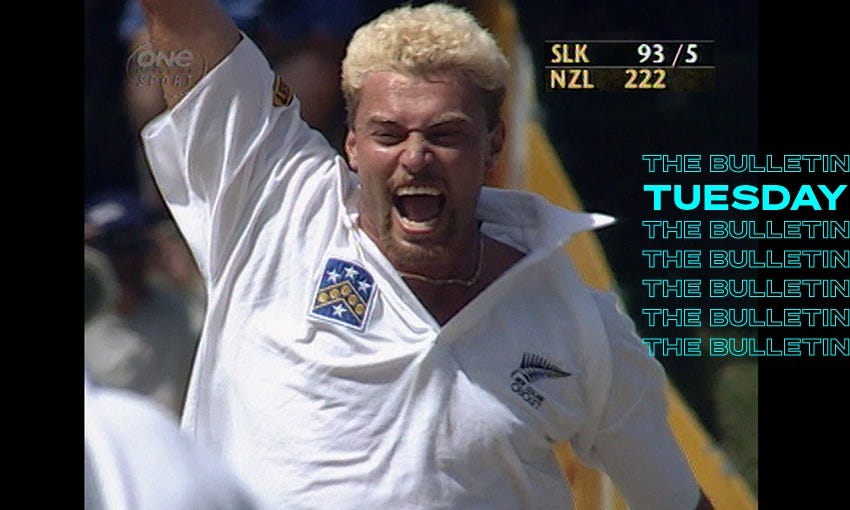The first gay Black Cap
Former Black Cap Heath Davis is this country’s first international male cricketer to speak publicly about being a gay professional athlete in a new episode of award-winning documentary, Scratched
Mōrena and welcome to The Bulletin for Tuesday, August 2, by Anna Rawhiti-Connell. Presented in partnership with Z Energy.
In today’s edition: Nation’s favourite soap to assist in health sector recruitment; reduced isolation period under consideration; Chinese ambassador addresses perception problem; but first, Heath Davis talks about his career and the life he kept separate from sport.
Heath Davis debuted for the Black Caps in 1994 and has not spoken publicly about his experience as a gay professional athlete until now. (Image: Scratched)
Heath Davis kept his two lives separate
This morning, the final episode of The Spinoff’s documentary series on Aotearoa’s lost sporting legends, Scratched, debuted. It is the story of former Black Cap Heath Davis and is the first time an international male cricketer from New Zealand has spoken publicly about their experience as a gay professional athlete. Davis, whose story features on the front page of the Dominion Post this morning, is something of a cult cricketing hero who played for Wellington and New Zealand in the 90s. In a feature published this morning, director of the episode and editor of The Spinoff, Madeleine Chapman, discusses his career and his very human, complicated and nuanced grappling with who he is.
Growing up with the myth of Heath Davis
Davis’s New Zealand cricketing career ended in 2004. He moved to Brisbane and only really surfaced again in the public eye in 2009 after a work accident resulted in a portion of his left foot being amputated. Notorious for bowling no-balls, Davis joked that the amputation meant “no more no-balls”. Davis was selected for the Black Caps in 1994 and was one of the fiercest pace bowlers in the world at the time. The Bounce’s Dylan Cleaver played with Davis in age-group rep teams in the Hutt Valley and Wellington sides. On The Spinoff this morning, he recalls being nowhere near good enough to deal with him.
The marked contrast between queer elite female and male athletes
The claim that Davis is our first gay Black Cap is of course, entirely hypothetical. In the documentary, Stephen Mather notes the statistical improbability of Davis actually being the first gay first class cricketer in New Zealand. Out and proud are still choices for every individual to make, and the decision to tell his story is Davis’s alone. But the lack of publicly gay athletes, especially in traditionally male-dominated codes like cricket, league and rugby, does raise questions about our sporting culture. Alice Soper discusses the stark contrast with women’s sports where, as Soper writes “Queer wāhine athletes have been so normalised across so many codes that it’s not unusual to see partners and wives end up playing alongside each other.”
Nearly 30 years on, queer athletes are still struggling with prejudice
Today’s news comes as researchers note a rise in anti-LGBT hate in New Zealand, and only a few days after an incident over the wearing of a pride jersey at the Manly Sea Eagles, decades after Davis’s experience. Sharni Williams, a gay sevens player in Australia, described the rejection of the jersey by several Manly players as a “punch in the face”. Ian Roberts, who became the first rugby league player to come out as gay while playing for Manly in 1995, said the player revolt "breaks my heart". Cronulla-Sutherland Sharks player Toby Rudolf has since backed the introduction of a pride round, saying he is sexually fluid and that “love is love”.
Watch the episode below, or on The Spinoff
Andrew Little announces measures to lift health worker numbers
Announced yesterday, the government has launched a plan to ease pressure on health workers and grow the workforce. It includes the government contributing up to $10,000 to an overseas nurse’s registration costs. It does not include adding nurses to the green list residency fastrack. If you think a change is what you need, you could try nursing. Also announced by minister of health Andrew Little yesterday, was news that long-running soap Shortland St will have a role to play in helping “assist with promoting nursing as a fantastic career”. The government won’t be funding the show, but producers will have access to government information to help it build a storyline.
Reducing Covid isolation period “under active consideration”
As Newsroom’s Jo Moir reports, the cabinet committee that reviews Covid settings is scheduled to do so early this month. The committee will consider shorter isolation periods, a test-to-work regime and widening the critical services list which allows household contacts to continue working if they meet certain criteria. Critical health care workers have been able to return to work before the end of their seven day isolation period but many haven’t been well enough to do so and uptake of the provision has been limited. Covid response minister Ayesha Verrall said that “In terms of the hypothesised economic benefit from reducing absenteeism in that way, we’re not sure that’s really there”. The committee will consider whether a testing-to-work regime would work better.
Why support The Spinoff? Here's what one of our legendary members had to say…
"As a New Zealander living in Sydney, The Spinoff helps me to feel in touch with what's happening back home. There's a great breadth to the content – from political stories to "best chippies" exposés – and the enthusiasm from your contributors is palpable. I feel happy and proud to be a member, and I hope The Spinoff continues to thrive and to demonstrate what can be achieved by independent media."
Ian Haigh, Sydney
Whether living here or abroad, if like Ian you value our work please show your support by becoming a member today.
Speech from Chinese ambassador addresses perception of China, media responsibility
China's ambassador to New Zealand, Wang Xiaolong delivered a speech to a China business summit in Auckland yesterday morning addressing the worsening perception of China by New Zealanders. He also said there was an important role to be played by responsible media, in helping the people on both sides to see things as they are. The Asia New Zealand foundation’s Perceptions of Asia survey, published in June, showed views of China had remained largely unchanged in the year to November 2021, with 37% of people viewing it a “threat”. However, the foundation also conducted a “mini-poll” in June which showed 58% of those surveyed now believed China was a threat.
Click and collect
New Zealand’s friendship with Sāmoa toasted by prime minister.
The government doesn't know exactly how many ineligible people have received the cost of living payment.
An Auckland historian believes a painting held in the Alexander Turnbull Library collection is a forgery.
Mihingarangi Forbes speaks to an MIQ worker who was there from day one, as the country’s last MIQ facility closes its doors.
Todd Niall looks at low local government election voter turnout in Auckland. Turnout was 35.2% in 2019.
Just a note on Friday’s Bulletin about court delays. I quoted a timeline from a Northern Advocate article that said “In Northland, judge-alone and jury trials are now being scheduled out to 2024”. The office of the Chief Justice has been in touch to say that: “A jury trial can currently be scheduled in the Whangārei High Court in early September 2023. For the District Court, a jury trial can currently be scheduled in the Kaikohe or Whangārei District Courts in 2023, and a judge-alone trial can likely be scheduled in Northland in 2022. There are no District Court jury trials scheduled in 2024 at this time.”
Got some feedback about The Bulletin, or anything in the news? Get in touch with me at thebulletin@thespinoff.co.nz. If you liked what you read today, share The Bulletin with friends, family and colleagues.
Nadine Anne Hura unpacks what rapper Eminem can teach us about climate change. Don Rowe meets the man behind an ambitious bid to give pounamu to every child in state care. Trevor McKewen reviews a new book about the unavoidable and damning link between sports and brain injury. Duncan Greive catches up with new broadcasting minister Willie Jackson on media podcast The Fold.
More gold for our cyclists, Joelle King and Paul Coll through to squash semi-finals
It continues to rain medals for the New Zealand team at the Commonwealth Games, this time on the bikes. Aaron Gate won gold and Campbell Stewart won silver in the men's 40km points race. Ellesse Andrews won gold in the women's keirin and Michaela Drummond won silver in women's 10km scratch race. In total, the New Zealand cycling team have bagged 13 medals. In the squash, Joelle King and Paul Coll are both through to the semi-finals of the singles. King battled hard against England’s Lucy Turmel with Turmel winning the first game. Both King and Coll play their semis in the wee hours tomorrow morning so I will once again be shooting for my own gold in browser refreshing to bring you the results as they come in.









